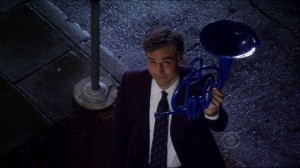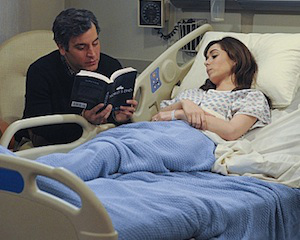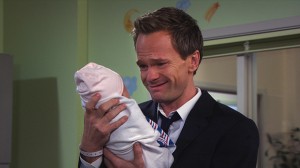…an episode reminding us all the importance of “not living in limbo.”
I have not been shy about extolling the virtues of this fifth season of Parenthood. Even when it’s been inconsistent (ahem Joel) or implausible (ahem Mayor Kristina), Parenthood never fails to deliver the proverbial goods on the character-based minutia that truly forms the backbone of this series. I’m not going to address the Joel and Julia stuff this week because frankly I’m tired of it.
All I will mention is the way that this episode opened: a series of Bravermans being interrupted in the midst of bedroom activities: Max interrupting an impending sojourn to “Funky Town” for Adam and Kristina with a declaration never to return to Cedar Knolls again, Zeek’s awkward coitus-interruptus between Jasmine and Crosby to announce his finding of a grille for his car project, and a braying phone awakening Julia about a $468 charge to her credit card (insert sad trombone noise). She’s alone, it sucks, Joel sucks. But let’s move on with life here, shall we? Julia doesn’t want to be stuck in limbo and the way this plotline has been dragged out, I second that motion. Preach!
Onward and upward, friends. Let’s dive in and explore what this episode did very well: pairing off characters.
Crosby and Zeek
In the midst of the seventy-two hour timeline the realtor granted Camille and Zeek to accept or decline last week’s offer on the Braverman homestead, Zeek opts to get out of dodge (#CarPuns) with Crosby to acquire what he termed the Golden Fleece of grilles. Much like the yarns of Greek mythology, this journey ends in the mystical land of Eugene, Oregon in the den of one colorful gentleman named Bernie because yes.
Along the way, it’s all chili dogs and glass-shattering opera (seriously, Zeek, spare us) until Crosby brings up the looming decision about what to do with the house. However, Zeek, adept at avoidance at all costs, has an acute bout of ATV ADD and adds an unexpected detour. It was around this time in the episode that I began to get a SNEAKING suspicion that this impromptu road trip might be about more than a grille? Kidding. Of course I knew all along because, like you, I am not an idiot.
By the time our road-weary travelers reach Bernie’s garage, things do not go well. Patience has never been a particularly noteworthy attribute of Zeek’s, and he really lets the Oregonian have it when he feels as if he’s being taken for a ride (#CarPuns2).**
**I don’t know about you, but this might have been a subtle commentary on the state of diplomacy in the world, or perhaps Zeek just struggles in the find art of GTFO of his own way. Either way.
But then, the surprise of the episode: Zeek confesses that this road trip was not really about the trip at all! I know, I gasped and clutched my pearls like the proper Southern belle I am, too! Say it ain’t so! Seriously, though, he’s feeling old and selling the house is just another step in that inevitable process, so he’s wary of it. Makes sense. Thankfully, Crosby knows what to do: piss off his wife by buying a motorcycle to make sure his dad gets the grille at the heretofore agreed upon $450. Classic Crosby!
Oh yeah, and tells Camille upon his return that he wants to sell the house. Aren’t healing road trips to find long lost, symbolic car parts just the best? You don’t have to answer that because obviously yes they are.
Drew, Victor, and Sydney
This week, we took a break from “The Continuing Journey of Drew, the Pothead Balladeer,” which allowed us to remember that he is actually a delightful and interesting character when not ensnared in a love triangle with an emotionally-wrought ex and a manipulative hell beast. So hurray!
This really proved a fascinating tangent to pursue in terms of fall out over Julia’s separation from Joel. Drew has handful of babysitting gigs (that are the #MostDepressingWaysToEarnFortyBucksEver), pairing him off with Sydney and Victor***, his two cousins that he claims hate him. Maybe they’re listening to his original songs? Sorry, but probably they were.
***Leave it to Sydney to turn a run-of-the-mill sibling spat over a turn at a video game into an indictment of Victor’s difficulties in school. Seriously, if ever a character were a hemorrhoid on the underside of Satan’s hindquarters, it’s Sydney. I don’t care for her ‘tude. No way, no how.
Until this episode, I never considered how Drew and Amber are very much reflections of Sydney and Victor. What a perfect opportunity to bond over the crowd-pleasing topic of broken homes! I’m glad to know roller rinks are still able to bring people together. I guess clumsily navigating around a slick circle for hours on end will just never get old.
Seriously, this was great stuff, maybe my favorite off-shoot of an overall very drawn out and inconsistent plot. Not only did it rehabilitate Drew’s character but it also provided us with an insight into the way separation and divorce can both split apart and unite those affected by it. An excellent paradox handled with subtlety and compassion. More like this please! (And a WHOLE lot less of Julia dating Ed because ugh).
Sarah and Mark Cyr (HUH?!?!?!?)
Okay, okay. I buried the lead a bit here. Yes, Jason Ritter returned this week as English teacher/former fiancee of Sarah Braverman/sporter of unfortunate facial hair Mark Cyr. It all (re)begins with an incredibly awkward–but perfectly performed–stop-and-chat between him and Amber. After muddling through the ideal chitchat and pleasantries expected, Mark asks after Sarah and leaves.
In a nice contrast, the scene cuts to Sarah and Hank hanging up a framed copy of the Surf Sport photo that seems to have launched Sarah’s photo career in earnest, now that she and Hank have a follow up gig for some organic skin cream. The juxtaposition of this editing is clear: Sarah seems perpetually caught between the two men she left. A deft touch.
But let’s not forget the true victims of Sarah’s artistic success: her neglected tenants, who have been living in LITERAL darkness, adrift in a sea of discarded catalogue. Who was that lady and why do I want to smack her with one or possibly all of the catalogues?
Amber arrives with news of her run-in with Mark, visibly affecting Hank, who had recently opened up to Sarah about enjoying their time together.**** Before long, Mark calls up, asking to meet face to face for the purpose of relaying big news.
Anyhow, it turns out Mark’s publication in a literary magazine with a circulation of 37 WHOLE PEOPLE wasn’t the sole reason for their meeting. Also, he’s engaged. So, there’s that. What I found amazing is that, after this truth bomb, the two pick up their menus and actually–it seems–have dinner together? (#BigBowlofAwkward)
****I’m absolutely loving Hank’s continued therapy sessions with Dr. Pelican. It gives Ray Romano additional chances to shine and more screen time for the best character on the show (imo), so that’s win-win from my perspective!
Great stuff, but nothing worked as well as that sly smile during the photo shoot when Sarah tells Hank about the engagement. Drop that anchor ’cause I’m shipping these two hard!
Elsewhere, Kristina and Adam disprove of the school’s handling of Max’s field trip incident, Max takes up (deeply symbolic) surfing because #CedarKnollsSucks, Joel has no interest in fixing his marriage, as he feels Julia disrespected him in their marriage (seriously, wtf and get a grip), and…oh hi, Jabbar! Glad you’re still around. Where you been, boy?
Another solid episode of Parenthood, but that’s a foregone conclusion. If we can just wrap up the Julia-Joel saga one way or the other and keep Drew out of Natalie’s orbit, then this last string of episodes will just improve on what’s come before.
Conversation Around the Dinner Table
– Amber: “Common interests? It’s not E Harmony. It’s babysitting.”
– Sarah [to Hank]: “Really, you had a negative outlook on something? Shocker.”
– Crosby: “I’m going to write a bad review on Yelp about this!”
–



